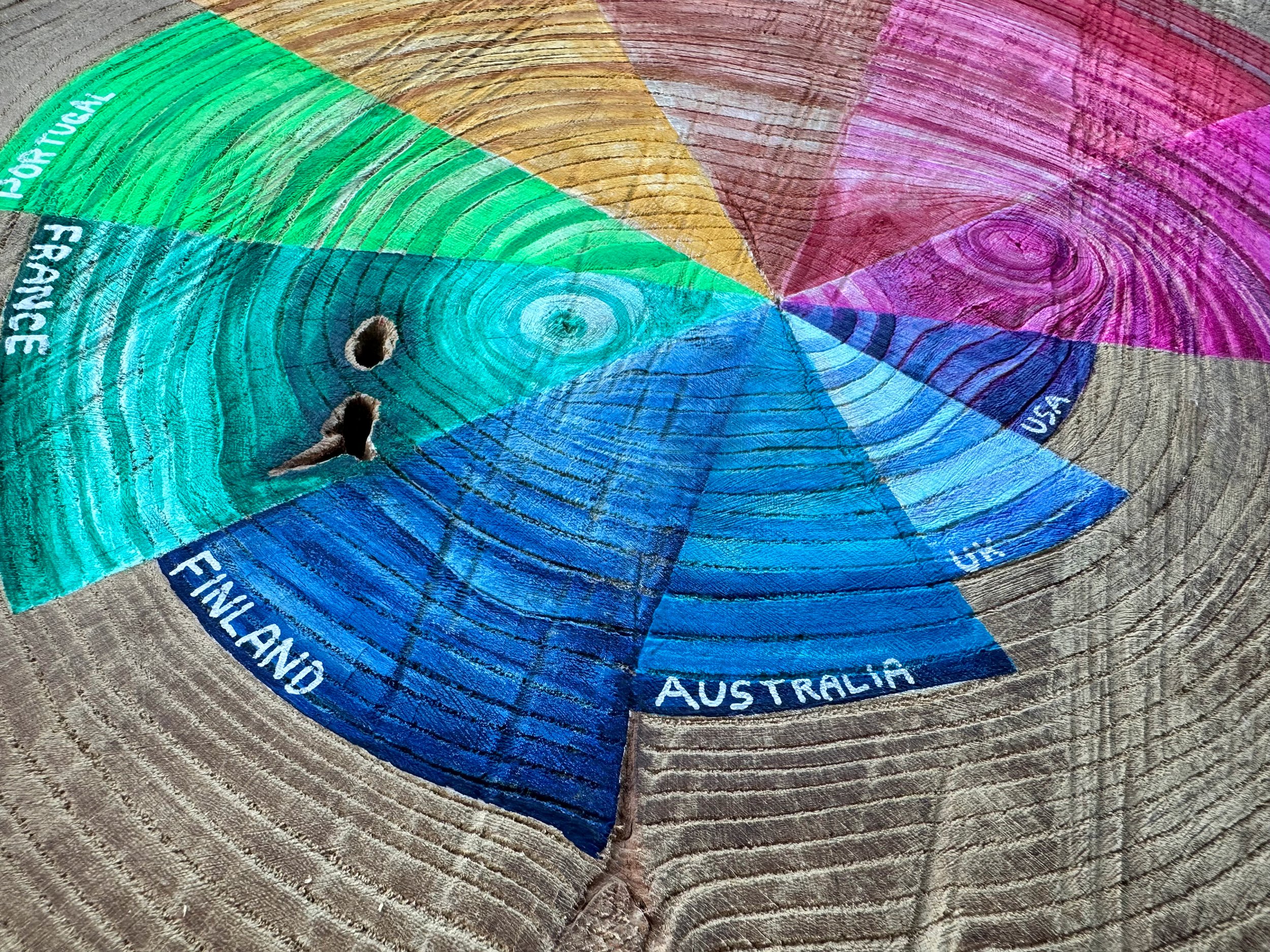
Rings of Record
Where Ignorance Grows Quietly
These tree cross-sections hold more than time. They carry the slow accumulation of unspoken change, a time before knowing. Each painted ring visualises climate emotions: fear, anxiety, anger, hope, shaped by real data, real stories, and real feelings. Nature has been keeping score quietly all along. The listening has deepened and the urgency is growing. This emotional record draws from a major global study exploring how young people across ten countries are experiencing climate change. It is both deeply personal and undeniably collective. The data visualised here is explored further below.




Climate Anxiety & Global Insights
This data comes from a 2021 global study led by Dr Caroline Hickman and an international team of researchers, published in The Lancet Planetary Health. The survey included 10,000 young people aged 16-25 from Australia, Brazil, Finland, France, India, Nigeria, the Philippines, Portugal, the UK, and the USA. Funded by the University of Bath and partner institutions, the study explores how climate change is shaping emotional wellbeing, worldviews, and trust in governments. Its findings resonate with the work of Dr Britt Wray, a leading voice on climate and mental health. Wray describes climate anxiety as both a rational response and a spark for collective care, encouraging us to move through despair toward connection, agency, and resilience. The colour palette is drawn from the Emotional Climate Wheel, with each hue representing a distinct climate emotion: anxiety, grief, hope, overwhelm, and more. The result is a layered emotional landscape, built from nature and shaped by data.
“We are seeing a generation that feels deeply worried and rightly so.”
Level of Worry About Climate Change
84% of young people surveyed said they were at least moderately worried about climate change.
For many, the worry is constant, woven into everyday thinking.
- 38% Extremely worried
- 21% Very worried
- 25% Moderately worried
- Only 5% said they were not worried at all
“We are seeing a generation that feels abandoned in facing the climate crisis.”
Feelings About the Future
Young people are not just concerned about rising temperatures they’re questioning what kind of world they’ll inherit. This data shows how fear for the future shapes everyday life.
Feelings reported:
- 75% Frightening
- 15% Neutral / Other
- 10% Hopeful (estimated)
“Humanity Is Doomed”
56% agreed with this statement. This belief reveals the scale of despair felt not just about climate change, but about systems failing to protect life. A belief expressed not with apathy, but with deep grief and loss of trust.
Feelings of Powerlessness
51% of young people said they felt powerless in the face of climate change. Even with awareness and care, many don’t feel they have the tools or support to make a difference.
- 61% felt powerless
- 25% felt empowered
- 14% were unsure
Perception of Government Betrayal
58% said they felt betrayed by governments’ failure to act. This is more than political frustration it’s a deep emotional rupture between generations and those in power.
- 56% of respondents said they feel betrayed by government inaction
- 44% said they do not feel betrayed
Emotional Responses to Climate Change
Sadness, anxiety, anger, powerlessness these were the most common emotions. More than half felt multiple emotions at once, showing just how layered the response can be. More than half of young people surveyed reported feeling:
- 55% Sad
- 55% Anxious
- 52% Angry
- 51% Powerless
- 50% Helpless
- 50% Guilty

Impact on Daily Functioning
45% of young people said climate-related worry was affecting their ability to sleep, concentrate, or manage daily tasks. It’s a crisis felt not just in ecosystems but in bodies and minds.
Breakdown of responses:
- 21% Strongly agree
- 24% Somewhat agree
- 18% Neutral
- 20% Somewhat disagree
- 17% Strongly disagree
“The Future Is Frightening”
75% of young people surveyed agreed with this statement - a powerful reflection of both personal uncertainty and shared grief for what is unfolding. This is one of the most unifying responses across countries.
“The climate crisis is robbing young people of their ability to imagine joyful futures”
Hesitancy to Have Children
39% of respondents said climate concerns make them hesitant to have children. The climate crisis is altering not only our present but how we imagine the next generation.
- 39% said climate change made them hesitant to have children
- 61% said no or were undecided
Belief That Governments Are Not Doing Enough
64% believed their governments are not being honest about the effectiveness of their climate responses. Mistrust grows when promises don’t match action. 64% said their government is not doing enough
Countries with the highest distrust:
- 89% Brazil
- 86% Philippines
- 83% India
- 74% Nigeria
“Trust is a critical part of hope.
And that’s what’s slipping.”

Belief That Governments Are Not Doing Enough

Materials:
Each ring is painted in gouache on wood, using timber sourced from local trees: Elm (Rissington), Oak (Havelock North), and Karaka (Marianui School, Napier).
Sources:
Hickman et al. (2021), Climate anxiety in children and young people and their beliefs about government responses to climate change, The Lancet Planetary Health.
Wray, B. (2022), Generation Dread: Finding Purpose in an Age of Climate Crisis.
